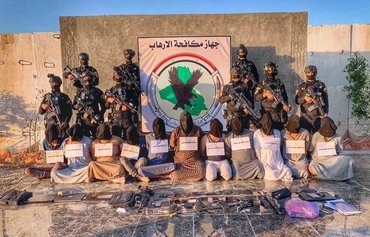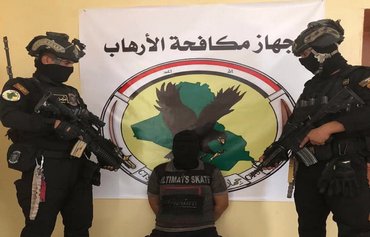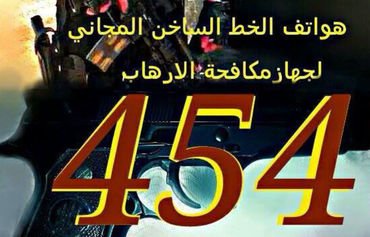Iraqi security forces have arrested hundreds of "Islamic State of Iraq and Syria" (ISIS) operatives over the past three months in intelligence-based operations designed to exert increasing pressure on the terrorist group.
In May and June, security forces arrested 419 ISIS operatives wanted for terrorist crimes, according to Abu Ali al-Basri, director of the Ministry of Interior's Al-Suqour intelligence unit.
The arrests took place as a result of a series of high level operations led by intelligence and counter-terrorism units in collaboration with the Ministry of Defence's Joint Operations Command in seven provinces including Anbar, Ninawa, Kirkuk and Baghdad.
ISIS had planned to build weapons caches and hideouts for its members, in an attempt to shield them from Iraqi intelligence surveillance and tracking operations, al-Basri said July 22nd according to local media reports.
![Iraqi army intelligence forces discover weapons and explosives in an ISIS hideout in Kanaan, Diyala province, in mid-July. [Photo courtesy of the Directorate of Military Intelligence]](/cnmi_di/images/2020/08/06/25201-Iraq-army-ISIS-600_384.jpg)
Iraqi army intelligence forces discover weapons and explosives in an ISIS hideout in Kanaan, Diyala province, in mid-July. [Photo courtesy of the Directorate of Military Intelligence]
"However, they have lost them all thanks to the high level operations, which has weakened the group's logistical and IED building capabilities," he said.
ISIS cells dismantled
The intelligence and counter-terrorism operations continued in July and August, with 28 terrorists arrested between July 1st and July 24th in Anbar, Mosul and Salaheddine, according to the Military Intelligence Directorate.
An ISIS tunnel-digging expert and an operative specialising in providing "ISIS sponsorships" (salaries and financial help to ISIS members and their families) were among those arrested, the Directorate said.
The Iraqi Counter-Terrorism Service (CTS) executed two major operations on July 21st and 23rd, Iraqi security analyst Haitham al-Khazaali told Diyaruna.
The first led to the arrest of a dangerous three-member terrorist cell whose locations were tracked in Kirkuk and Salaheddine provinces, he said.
The second operation resulted in the arrest of two operatives, one of whom was involved in the 2014 Camp Speicher (Tikrit Air Academy) massacre.
Iraqi forces on Monday (August 3rd) also arrested seven wanted ISIS elements in Ninawa province, the Interior Ministry said in a statement.
The intelligence effort is making progress in part due to the fact that security forces are relying on cultivated sources and the confessions of detained terrorists, al-Khazaali said.
Iraqi forces have "acquired security expertise regarding the enemy's plans and the deployment of its operatives", he said.
Security operations have led to dismantling a number of ISIS sleeper or active cells in rural areas in northern and eastern parts of the country and in the western desert, and have destroyed the group's infrastructure and blocked its supply lines, al-Khazaali said.
Among the detainees arrested in July is a terrorist called "Abu Aisha" who is an explosives and car bomb expert along with two of his comrades, he said.
ISIS under immense pressure
Iraqi lawmakers are in constant contact with army, police and intelligence commanders to discuss the ongoing security operations, said Iraqi MP Katah Najman al-Rikabi, who serves on the security and defence committee.
Through keeping abreast of the security effort, they have started to notice over the past several months a clear military build-up to tighten the noose on ISIS cells, he told Diyaruna.
What distinguishes the current security operation is that it is two-fold, he said. On the one hand, it is geared towards implementing large scale operations -- such as the "Heroes of Iraq" military campaign -- to clear large swathes of rugged terrain abundant with natural caves.
On the other hand, it involves swift security operations that largely rely on intelligence gathered from recently identified targets.
"This pressure has weakened the terrorists and it is impossible for them to take control of any territory or pose a real threat," al-Rikabi said. "Their only tactic is to hit and run."
"In order for the group to stay fragmented, the attacks targeting its cells and incubators should be unrelenting and we need to urge the local population to continue supporting the security forces as they are an essential factor in the equation of maintaining stability," he said.
Abdul Khaliq al-Azzawi, another member of the parliament's security and defence committee, also emphasised the importance of intelligence in the fight against terrorists.
"In an effort to preserve the wins achieved from the battle, we need to maintain the trust between the local population and the forces that protect them," he told Diyaruna.
"[We need to] bring the displaced population back to their villages and rebuild deserted villages... which could provide a safe haven for terrorists," al-Azzawi said.
To preserve the people's trust in the security forces, intelligence must be thorough and not lead to the arrest of innocent people, he said.

![Iraqi Counter-Terrorism Service forces arrest two ISIS operatives in mid-July. [Photo courtesy of Iraq Counter-Terrorism Service]](/cnmi_di/images/2020/08/06/25200-ISIS-Iraq-intelligence-600_384.jpg)






